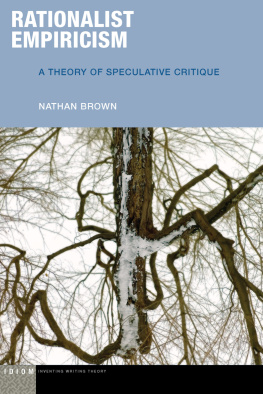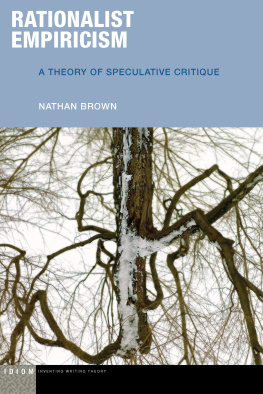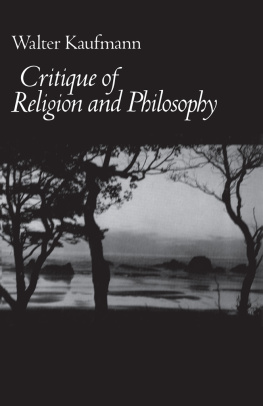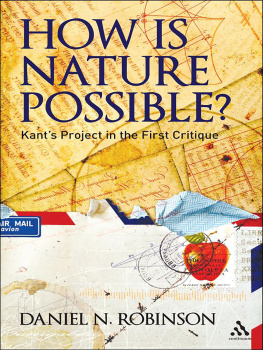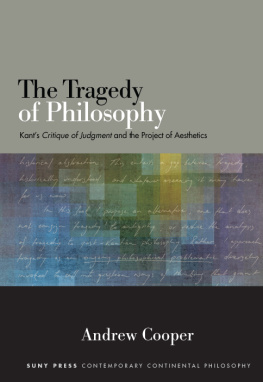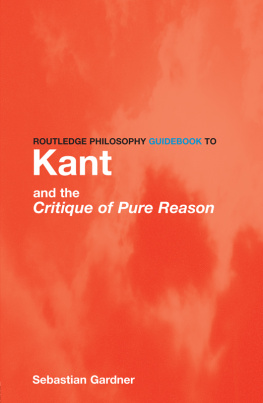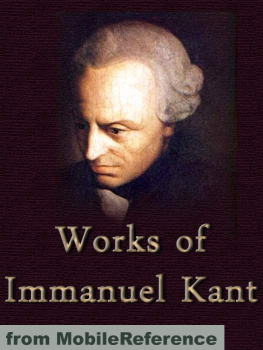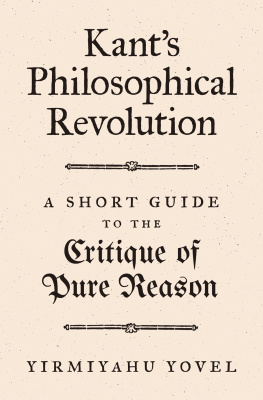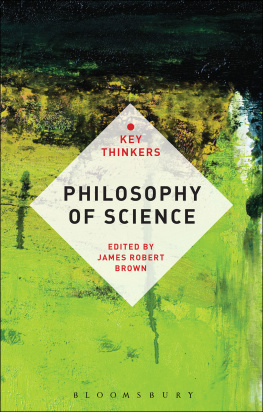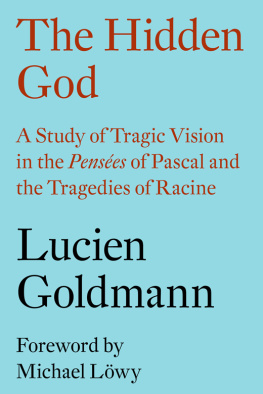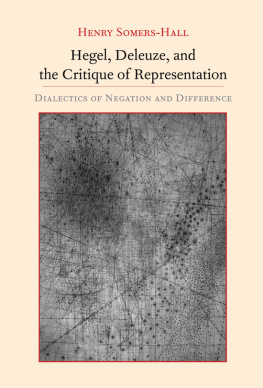
RATIONALIST EMPIRICISM
IDIOM INVENTING WRITING THEORY
Jacques Lezra and Paul North, series editors
RATIONALIST EMPIRICISM
A THEORY OF SPECULATIVE CRITIQUE
NATHAN BROWN
Fordham University Press New York 2021
Copyright 2021 Fordham University Press
All rights reserved. No part of this publication may be reproduced, stored in a retrieval system, or transmitted in any form or by any meanselectronic, mechanical, photocopy, recording, or any otherexcept for brief quotations in printed reviews, without the prior permission of the publisher.
Fordham University Press has no responsibility for the persistence or accuracy of URLs for external or third-party Internet websites referred to in this publication and does not guarantee that any content on such websites is, or will remain, accurate or appropriate.
Fordham University Press also publishes its books in a variety of electronic formats. Some content that appears in print may not be available in electronic books.
Visit us online at www.fordhampress.com.
Library of Congress Cataloging-in-Publication Data available online at https://catalog.loc.gov.
Printed in the United States of America
23 22 21 5 4 3 2 1
First edition
for Petar Milat
CONTENTS
Empiricism and rationalism are bound, in scientific thought, by a strange bond, as strong as that which unites pleasure and pain.
Gaston Bachelard, The Philosophy of No
INTRODUCTION: THE PHILOSOPHICAL CONJUNCTURE
Speculative thinking is the soul of philosophy. But insofar as speculation is opposed to critique, it can only give rise to dogmatism. This has recently been made clear, once again, by the fortunes of the speculative turn in twenty-first century philosophy. Its most zealous promoters, converting the venerable legacy of speculative thought into the cultural capital of ersatz theoretical movements, have merely repeated the forms of dogmatism Kant and Marx rightly delimited while pretending to move beyond these critical delimitations. The lesson to be drawn from this waning episode of intellectual history is that although philosophy cannot allow critical reflection to cancel its speculative powers, speculation can only move forward in concert with critique. The claim of this book is that the mutually reinforcing relationship between speculation and critique, without which philosophy devolves into incoherence or common sense, depends upon sustaining the methodological tension between rationalism and empiricism.
One aim of Kantian critique was to displace the opposition between rationalist and empiricist orientations through the invention of transcendental philosophy. Delimiting pure reason and refuting the immediacy of experience, Kants philosophy aimed to ground any possible experience in transcendental conditions while invalidating the direct application of reason to knowledge of objects beyond possible experience. The competing claims of rationalist and empiricist thinkers to the priority of either reason or experience would be countered by the priority of the transcendental, which would ground the legitimate extension of both philosophical and scientific knowledge within critical limits.
Transcendental critique arrives at the limit of its critical vocation and pushes the speculative vocation of philosophy further not through the failure of critique but by ungrounding it, by undermining the very function of the subject as ground it had hoped to establish, and thus implicitly suggesting the methodological problem of (1) how critique can continue to function as ungrounded; and (2) how speculation is related to critique without grounds.
The answer to these questions, pursued and modeled in the following chapters, lies in a reengagement of the opposition between rationalism and empiricisman effort to rethink the apparent contradiction between the priority of reason and the priority of experience without appeal to the priority of the transcendental, and thus in a manner shorn of transcendental guarantee. If we criticize the delimitation of knowledge to the field of possible experienceas we mustwe thereby reopen the transcendentally displaced question of how the methodological relationship of rationalism and empiricism is to be theorized and practiced. If the transcendental does not suffice to ground the displacement of their opposition, because the subject of transcendental conditions is ungrounded, how can the claims of rationalism and empiricism be brought into a mutually reinforcing dialectic that does not accept or rely upon the priority of either method? I pose this question as the problem of the relationship between speculation and critique.
What I call rationalist empiricism involves the delimitation of transcendental philosophy through speculative critique. The methodological trajectory thus designated does not accept the severance of speculation from critique, nor critique from speculation. Rather, it aims to marshal the critical power of the tension between rationalism and empiricism to check one anothers claims and to propel those claims further. In order for this movement of critical delimitation and speculative extension to function, rationalism and empiricism can neither be collapsed into one another, nor defended as methodologically autonomous from or superior to the others claims. Nor can the tension of their opposition be displaced by appeal to transcendental grounds. Philosophy must sustain a relational disjunction of rationalism and empiricism in order to sustain the power of speculative critique.
By rationalist I mean to denote a philosophical orientation deploying the power of reason to push thought beyond the limits of experience, to explore what has to be thought according to the internal order and consistency of ideas. By empiricism I refer to a philosophical orientation claiming the genesis of ideas in experience and grounding the determination of what is the case on the consistency of thinking with experiential fact. But what are the limits of experiential fact? Is what happens in thought itself a form of experience? Does the exploration of the order and consistency of ideas itself yield experiential facts? Are there forms of experience that cannot be subordinated to knowledge gleaned from experience? What is at issue in such questions is how one determines criteria of the a priori and the a posteriori, and how exactly one conceives the relation of rationalism and empiricism to these categories. Rationalist empiricism denotes, one the one hand, a methodological attunement toward the experience of thinking as included in the field of what happens and, on the other hand, an attunement to the power of thought to push the field of facts beyond the presumed synthesis of the past with the future, referring what happens to what has to be thought, rather than to the succession of experience. I refer to rationalist empiricism rather than empiricist rationalism because it is the advent of reason, intervening in experience, that inaugurates philosophical speculation and that requires critique. Rational speculation cannot be grounded by or limited to experience, but it involves a commitment to empiricism insofar as it cannot violate the critical force of scientific knowledge. A rationalist orientation toward empiricism pushes beyond the limits of experience through the order and connection of ideas, but such an orientation can neither ground nor invalidate the criteria of experience within limits. The delicate task of rationalist empiricism is thus to preserve the distinction and autonomy of its methodological poles while also submitting each to the critical interrogation of the other, acknowledging and accounting for the discrepancy of their criteria.
Next page
